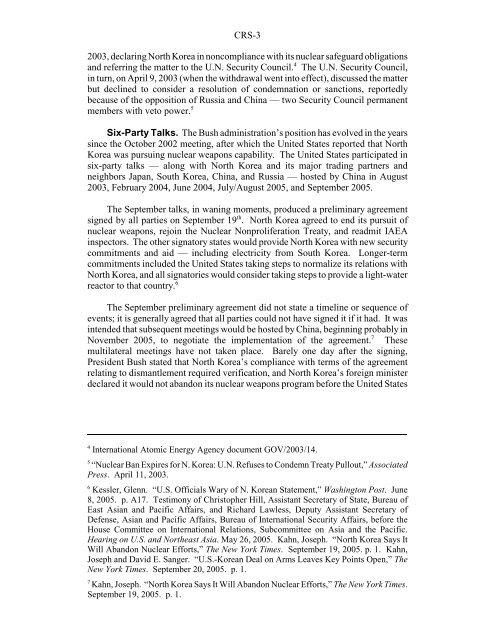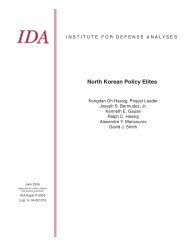North Korea: Economic Sanctions - North Korean Economy Watch
North Korea: Economic Sanctions - North Korean Economy Watch
North Korea: Economic Sanctions - North Korean Economy Watch
You also want an ePaper? Increase the reach of your titles
YUMPU automatically turns print PDFs into web optimized ePapers that Google loves.
CRS-32003, declaring <strong>North</strong> <strong>Korea</strong> in noncompliance with its nuclear safeguard obligationsand referring the matter to the U.N. Security Council. 4 The U.N. Security Council,in turn, on April 9, 2003 (when the withdrawal went into effect), discussed the matterbut declined to consider a resolution of condemnation or sanctions, reportedlybecause of the opposition of Russia and China — two Security Council permanentmembers with veto power. 5Six-Party Talks. The Bush administration’s position has evolved in the yearssince the October 2002 meeting, after which the United States reported that <strong>North</strong><strong>Korea</strong> was pursuing nuclear weapons capability. The United States participated insix-party talks — along with <strong>North</strong> <strong>Korea</strong> and its major trading partners andneighbors Japan, South <strong>Korea</strong>, China, and Russia — hosted by China in August2003, February 2004, June 2004, July/August 2005, and September 2005.The September talks, in waning moments, produced a preliminary agreementsigned by all parties on September 19 th . <strong>North</strong> <strong>Korea</strong> agreed to end its pursuit ofnuclear weapons, rejoin the Nuclear Nonproliferation Treaty, and readmit IAEAinspectors. The other signatory states would provide <strong>North</strong> <strong>Korea</strong> with new securitycommitments and aid — including electricity from South <strong>Korea</strong>. Longer-termcommitments included the United States taking steps to normalize its relations with<strong>North</strong> <strong>Korea</strong>, and all signatories would consider taking steps to provide a light-waterreactor to that country. 6The September preliminary agreement did not state a timeline or sequence ofevents; it is generally agreed that all parties could not have signed it if it had. It wasintended that subsequent meetings would be hosted by China, beginning probably inNovember 2005, to negotiate the implementation of the agreement. 7 Thesemultilateral meetings have not taken place. Barely one day after the signing,President Bush stated that <strong>North</strong> <strong>Korea</strong>’s compliance with terms of the agreementrelating to dismantlement required verification, and <strong>North</strong> <strong>Korea</strong>’s foreign ministerdeclared it would not abandon its nuclear weapons program before the United States4International Atomic Energy Agency document GOV/2003/14.5“Nuclear Ban Expires for N. <strong>Korea</strong>: U.N. Refuses to Condemn Treaty Pullout,” AssociatedPress. April 11, 2003.6Kessler, Glenn. “U.S. Officials Wary of N. <strong>Korea</strong>n Statement,” Washington Post. June8, 2005. p. A17. Testimony of Christopher Hill, Assistant Secretary of State, Bureau ofEast Asian and Pacific Affairs, and Richard Lawless, Deputy Assistant Secretary ofDefense, Asian and Pacific Affairs, Bureau of International Security Affairs, before theHouse Committee on International Relations, Subcommittee on Asia and the Pacific.Hearing on U.S. and <strong>North</strong>east Asia. May 26, 2005. Kahn, Joseph. “<strong>North</strong> <strong>Korea</strong> Says ItWill Abandon Nuclear Efforts,” The New York Times. September 19, 2005. p. 1. Kahn,Joseph and David E. Sanger. “U.S.-<strong>Korea</strong>n Deal on Arms Leaves Key Points Open,” TheNew York Times. September 20, 2005. p. 1.7Kahn, Joseph. “<strong>North</strong> <strong>Korea</strong> Says It Will Abandon Nuclear Efforts,” The New York Times.September 19, 2005. p. 1.













